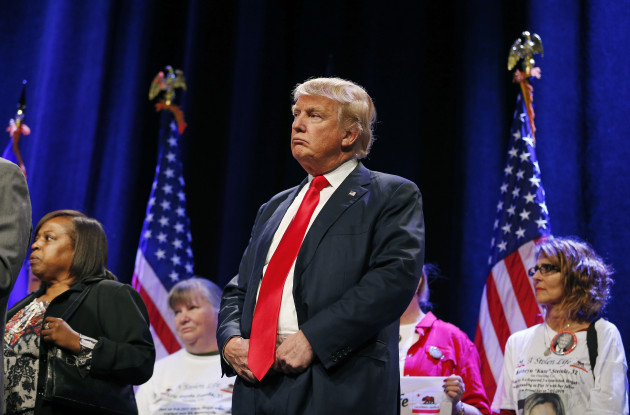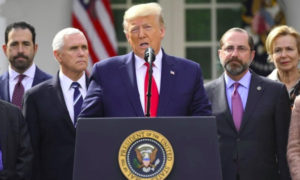Wisconsin Law Deterred 17,000 From Voting, Study Says
The voters most affected were black or poor—people considered likely to have voted for Hillary Clinton over Donald Trump. Donald Trump in 2015. (John Locher / AP)
Donald Trump in 2015. (John Locher / AP)
Donald Trump was able to win the presidency thanks to 78,000 voters in three states who voted for him over Hillary Clinton. About 22,700 of these votes were in Wisconsin, which has historically voted Democratic and yielded 10 electoral votes to Trump. It was the first election in which Wisconsin’s new voter ID law was in effect.
On Monday, a study was released that shows “an estimated 16,800 people in [Wisconsin’s Dane and Milwaukee counties] may not have voted because they believed they lacked the proper identification or because they were actually turned away at the polling place. Given margins of error, the number could be as high as 23,000 — about as many votes as Trump’s margin of victory.”
Those most affected by the voter ID laws were black or from poorer demographic groups—those more likely to vote Democratic. The Washington Post says:
The researchers sent the nonvoters a survey asking them to identify the primary reason they didn’t vote and collecting demographic data. Acknowledging that precision can be tricky particularly for demographic groups for which less data was collected, the portion of nonvoters who said they were deterred by the law was 11.2 percent. White nonvoters, though, were much less likely to report being deterred by the ID law, as were more wealthy respondents to the survey.
“Blacks,” the report states, “are statistically significantly more affected than Whites in Dane and Milwaukee Counties” by the ID law. It’s important to note that the sample size of black respondents was small, hence the wide range of uncertainty in the graph below. But that the confidence intervals (light-colored bars) for black and white respondents don’t overlap indicates statistical significance.
The findings of this study reinforce those of a study issued in February. According to Think Progress:
A new study by political scientists Zoltan L. Hajnal, Nazita Lajevardi, and Lindsay Nielson explains what these laws do accomplish, however. According to Hajnal and his co-authors, turnout among Hispanic voters is “7.1 percentage points lower in general elections and 5.3 points lower in primaries” in states with strict voter ID laws. The laws also reduce turnout among African-American and Asian-American voters…
Hajnal and his co-authors also offer a possible explanation for why conservatives favor these laws. “By instituting strict voter ID laws,” they explain, “states can alter the electorate and shift outcomes toward those on the right.” In states with such laws “the influence of Democrats and liberals wanes and the power of Republicans grows.”
Your support matters…
Independent journalism is under threat and overshadowed by heavily funded mainstream media.
You can help level the playing field. Become a member.
Your tax-deductible contribution keeps us digging beneath the headlines to give you thought-provoking, investigative reporting and analysis that unearths what's really happening- without compromise.
Give today to support our courageous, independent journalists.






You need to be a supporter to comment.
There are currently no responses to this article.
Be the first to respond.